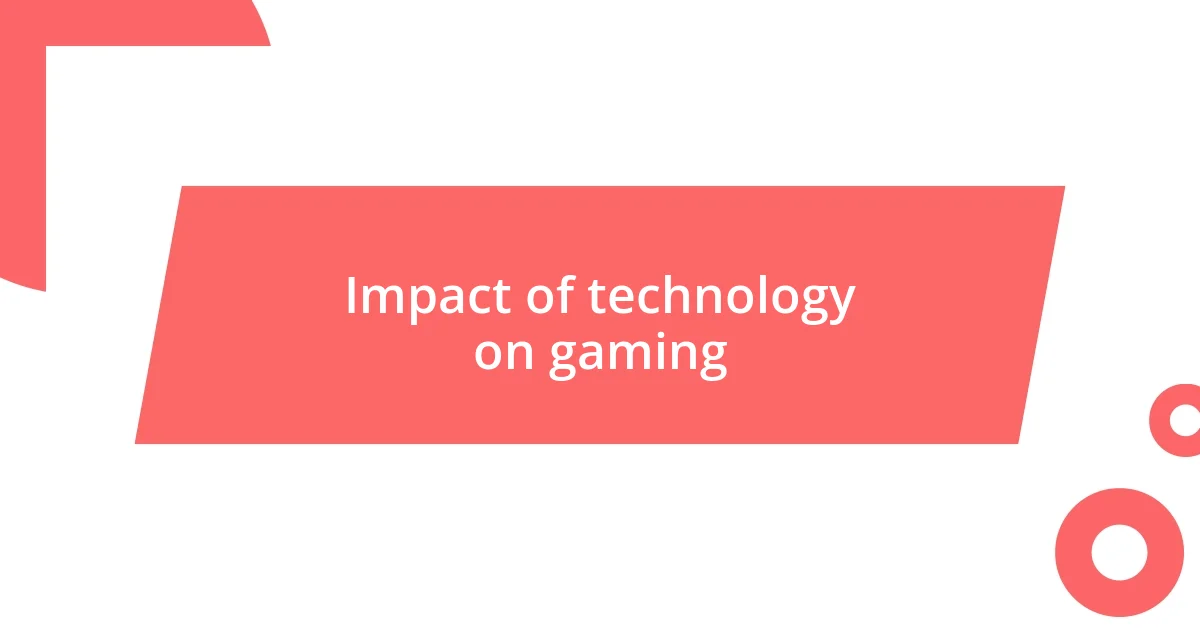Key takeaways:
- The evolution of gaming culture from a niche hobby to a global phenomenon marked by community-building through online platforms and events like esports.
- Significant milestones include the launch of iconic consoles like the NES and PlayStation, which transformed gaming graphics and storytelling.
- Future trends suggest an increase in immersive experiences through augmented reality, deeper storytelling, and diverse narratives that reflect various cultures and perspectives.

Understanding gaming culture origins
Gaming culture has deep roots that trace back to the early days of video games, often seen as a niche hobby for tech enthusiasts. I still remember playing my first arcade game—Pac-Man—sitting on a wobbly stool, surrounded by a haze of neon lights and a cacophony of sounds. That moment felt magical; it was a glimpse into a world that connected us, even before online multiplayer existed.
As gaming evolved through the ’80s and ’90s, it began to foster a sense of community. Remember those late-night sessions with friends, controllers in hand, cheering each other on? I do. Whether it was co-op campaigns or battling it out in a fighting game, these shared experiences created memories and friendships that transcend the screen. How many times have you found yourself reminiscing about those epic gaming nights?
Fast forward to today, and gaming culture has transformed dramatically with the rise of esports and streaming. These platforms enable players not just to compete but to build entire communities around their passions. It’s fascinating to see how this evolution has shaped our interactions. Have you ever watched a live stream and felt that thrill of being part of a larger audience? It’s a unique blend of excitement and camaraderie that keeps evolving, and I wonder where we’ll go next.

Key milestones in gaming history
Key milestones in gaming history showcase how the industry has evolved from simple pastimes into a global phenomenon that shapes culture. I remember the thrill of eagerly awaiting the launch of the original Nintendo Entertainment System (NES) in the late ’80s. It wasn’t just a console; it was a doorway to countless adventures. The excitement of playing classics like “Super Mario Bros.” created a shared language among friends that still resonates today.
Some key milestones include:
- 1972: The birth of arcade gaming with “Pong,” introducing players to interactive entertainment.
- 1983: The North American video game crash, highlighting the industry’s volatility but paving the way for new standards.
- 1991: The launch of the Super Nintendo, which redefined graphics and storytelling in games.
- 1995: The arrival of the Sony PlayStation, marking the shift toward 3D gameplay and broader acceptance by mainstream audiences.
- 2004: Beginning of esports with competitive gaming events, leading to the rise of professional gamers and streamed tournaments.
- 2013: The emergence of platforms like Twitch, fundamentally changing how we interact with gaming and bringing communities together in real-time.

Impact of technology on gaming
The impact of technology on gaming has been nothing short of revolutionary. I recall my first encounter with online gaming; it was a whole new world. Suddenly, I wasn’t just playing against AI; I was squaring off against players from across the globe. This connectivity unlocked experiences that felt more dynamic and unpredictable—an exhilarating blend of collaboration and competition that simply wasn’t possible before.
As technology advanced, so did the graphics and mechanics of games. I still remember the first time I played a game with realistic 3D graphics; it was as if I had stepped into a living painting. Today’s games utilize cutting-edge technology like virtual reality (VR) to immerse players in rich, interactive worlds. It’s mind-blowing to think about how VR can take us right into the action. Have you ever put on a VR headset and felt your heart race as you maneuvered through a virtual battlefield? That level of immersion can create an emotional connection that transcends traditional gameplay.
Moreover, it’s fascinating to see artificial intelligence (AI) shaping the gaming experience. I remember playing a complex role-playing game where NPCs (non-player characters) responded differently based on my actions. It made my choices feel meaningful and added layers of depth to the story. With AI continuing to evolve, who knows how future games will challenge our perceptions and choices? This ongoing relationship between technology and gaming keeps me intrigued about what lies ahead.
| Technology Impact | Example |
|---|---|
| Online Connectivity | Global multiplayer experiences enhance competition and camaraderie. |
| Realistic Graphics | Advanced 3D engines create immersive gameplay environments. |
| Virtual Reality | Players are transported into games, experiencing them as if they were real. |
| Artificial Intelligence | NPCs react dynamically to player choices, enriching narratives. |

Rise of online gaming communities
The rise of online gaming communities has truly transformed the landscape of gaming for many of us. I fondly remember joining my first guild in an MMORPG; it was like stepping into a family of sorts where we strategized, shared tips, and even forged friendships that extended beyond the game. Isn’t it amazing how a virtual space can foster real connections?
As we embraced online platforms, I found that gaming wasn’t just about the thrill of competition; it became a communal experience. Participating in multiplayer games felt like attending a concert, where the energy of the audience (or team) fueled our performance. Have you ever felt that rush when coordinating a game-winning move with friends from different parts of the world? That shared elation was unparalleled and left a lasting impact on my love for gaming.
Looking back, the evolution of forums, Discord servers, and live streams has been a game changer. I often find myself reminiscing about late-night chats with fellow gamers, where our discussions transcended gameplay, diving into our personal lives or shared passions. These spaces have become vital to the overall experience, demonstrating that gaming culture thrives on connection and communication. How did we manage before they existed? It makes me appreciate how technology has not only enhanced gameplay but also built vibrant communities.

Future trends in gaming culture
Future trends in gaming culture hint at a more immersive and interactive experience as technology continues to evolve. I often think about how augmented reality (AR) could blend the gaming world with our real lives. Imagine walking down the street and interacting with characters or challenges that pop up around you. Wouldn’t that change how we perceive gaming as just a pastime, transforming it into a part of our everyday routine?
Another trend I anticipate is the increasing prominence of storytelling in games. As narratives become more sophisticated, I often wonder if games could rival movies in delivering emotional depth. I recall being completely engrossed in a narrative-driven game, feeling as if I were part of a compelling story. If more developers focus on weaving intricate tales, it could redefine player engagement and create a stronger emotional bond with characters.
Moreover, with the rise of diversity in game design, I see a future where storytelling embraces various cultures and perspectives. I remember playing indie games that highlighted narratives outside the usual frameworks. It felt refreshing and led me to see gaming as a canvas for broader societal issues. Could this shift toward inclusivity encourage players to connect with stories that reflect a multitude of human experiences? I believe it has the potential to enrich the culture around gaming, making it a powerful medium for empathy and understanding.

Personal reflections on gaming evolution
I recall the first time I booted up an old-school console, pumping my fists in the air as the screen lit up with pixelated graphics. It was a simple, joyful moment, but it sparked something within me that has only grown over the years. As gaming evolved from those nostalgic beginnings to immersive worlds filled with rich narratives and breathtaking visuals, I often ponder how far we’ve come. Isn’t it fascinating to witness those early, rudimentary experiences morph into the complex, layered storytelling we see today?
Thinking back to my teenage years, I remember the excitement of racing my friends in local multiplayer games. Those afternoons spent huddled around a TV, controllers in hand, created bonds that felt almost unbreakable. Fast forward to now, and I find myself marveling at how those connections have expanded into a global network, yet I sometimes miss that simplicity. Have you ever longed for the days when gaming was just about pure fun, devoid of competitive pressure or the allure of online fame?
Another vivid memory that stands out is my introduction to streaming. Watching players demonstrate skills and entertain audiences opened my eyes to a whole new way of engaging with games. Participating in chat rooms and experiencing the thrill of live interactions made me feel like part of something larger. It made me realize that gaming isn’t just a solitary experience; it’s a thriving culture that constantly evolves, where every player’s voice contributes to the larger narrative. How incredible is it that my love for gaming can connect me to diverse perspectives across the globe?















